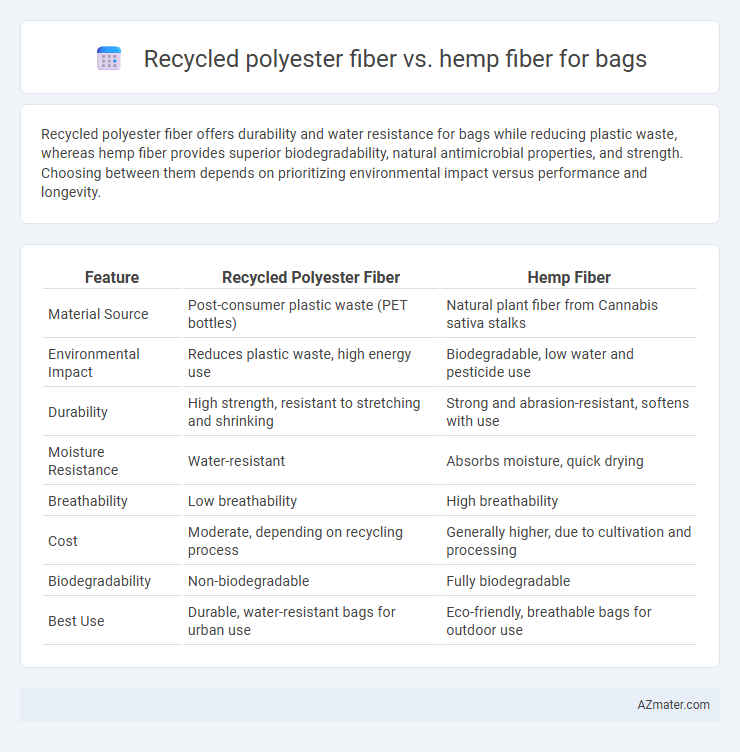Recycled polyester fiber offers durability and water resistance for bags while reducing plastic waste, whereas hemp fiber provides superior biodegradability, natural antimicrobial properties, and strength. Choosing between them depends on prioritizing environmental impact versus performance and longevity.
Table of Comparison
| Feature | Recycled Polyester Fiber | Hemp Fiber |
|---|---|---|
| Material Source | Post-consumer plastic waste (PET bottles) | Natural plant fiber from Cannabis sativa stalks |
| Environmental Impact | Reduces plastic waste, high energy use | Biodegradable, low water and pesticide use |
| Durability | High strength, resistant to stretching and shrinking | Strong and abrasion-resistant, softens with use |
| Moisture Resistance | Water-resistant | Absorbs moisture, quick drying |
| Breathability | Low breathability | High breathability |
| Cost | Moderate, depending on recycling process | Generally higher, due to cultivation and processing |
| Biodegradability | Non-biodegradable | Fully biodegradable |
| Best Use | Durable, water-resistant bags for urban use | Eco-friendly, breathable bags for outdoor use |
Introduction to Sustainable Bag Materials
Recycled polyester fiber is derived from post-consumer plastic waste, offering a durable and water-resistant option that reduces landfill impact and fossil fuel dependence. Hemp fiber, a natural and biodegradable material, provides high tensile strength and breathability while requiring minimal pesticides and water cultivation. Both fibers contribute to sustainable bag production by minimizing environmental footprints and promoting resource-efficient manufacturing.
Overview of Recycled Polyester Fiber
Recycled polyester fiber, derived from post-consumer plastic waste such as PET bottles, offers high strength, durability, and water resistance, making it ideal for bag manufacturing. This fiber reduces environmental impact by diverting plastic waste from landfills and oceans while consuming less energy compared to virgin polyester production. Its consistent quality and versatility allow for vibrant color retention and diverse fabric textures, enhancing the design options for eco-friendly bags.
Overview of Hemp Fiber
Hemp fiber is a sustainable, biodegradable natural fiber known for its exceptional strength and durability, making it highly suitable for bags. Unlike recycled polyester fiber, which originates from plastic waste and involves energy-intensive processing, hemp requires minimal pesticides and water, promoting environmental conservation. Its natural resistance to UV light and abrasion ensures long-lasting performance in bag manufacturing.
Environmental Impact: Recycled Polyester vs Hemp
Recycled polyester fiber reduces plastic waste by repurposing PET bottles, cutting down energy use and greenhouse gas emissions compared to virgin polyester, but it still relies on synthetic materials that contribute microplastic pollution. Hemp fiber is biodegradable, requires less water and pesticides, and enhances soil health through carbon sequestration, making it a more sustainable option with lower overall environmental impact. Choosing hemp fiber for bags supports circular economy principles and reduces dependency on fossil fuels, promoting eco-friendly production and disposal cycles.
Durability and Strength Comparison
Recycled polyester fiber exhibits high tensile strength and excellent resistance to abrasion, making it highly durable for heavy-use bags. Hemp fiber is renowned for its natural toughness and superior tensile strength, often surpassing recycled polyester in longevity and resistance to wear. Both materials offer robust durability, but hemp fiber provides a more sustainable and naturally resilient option for long-lasting bags.
Production Processes and Resource Use
Recycled polyester fiber is produced by melting and reforming plastic waste, primarily PET bottles, reducing reliance on petroleum and diverting plastics from landfills. Hemp fiber, extracted through mechanical decortication of hemp stalks, requires significantly less water and pesticides compared to conventional cotton, making it an eco-friendlier option with minimal chemical inputs. Both fibers offer sustainable benefits, but hemp's cultivation process emphasizes renewable agricultural resources, while recycled polyester focuses on circular waste management.
Biodegradability and End-of-Life Options
Hemp fiber offers superior biodegradability compared to recycled polyester fiber, breaking down naturally within months under composting conditions without releasing microplastics. Recycled polyester, derived from plastic bottles, resists biodegradation, often persisting in landfills for decades and posing environmental concerns. End-of-life options for hemp bags include composting and soil replenishment, whereas recycled polyester bags primarily rely on mechanical or chemical recycling, which can be limited by contamination and infrastructure availability.
Cost and Market Availability
Recycled polyester fiber offers a cost-effective option for bags due to lower material expenses and widespread industrial recycling programs, making it highly accessible in the market. Hemp fiber, while more expensive because of agricultural and processing factors, provides exceptional durability and sustainability but has limited availability in mass markets. The choice between these fibers depends on balancing budget constraints with environmental impact and supply chain stability.
Consumer Preferences and Trends
Consumers increasingly favor recycled polyester fiber for bags due to its durability, water resistance, and affordability, aligning with eco-conscious purchasing trends. Hemp fiber appeals to a niche market seeking natural, biodegradable, and sustainable materials known for strength and breathability. Market data reveals growing demand for eco-friendly bags, with recycled polyester dominating mainstream sales while hemp gains traction among environmentally driven consumers.
Conclusion: Choosing the Right Fiber for Bags
Recycled polyester fiber offers durability, water resistance, and cost-effectiveness, making it ideal for mass-produced, budget-friendly bags. Hemp fiber, known for its sustainability, biodegradability, and natural strength, suits eco-conscious consumers seeking environmentally friendly options. Selecting the right fiber depends on balancing durability, environmental impact, and production costs to meet specific bag usage and market demands.

Infographic: Recycled polyester fiber vs Hemp fiber for Bag
 azmater.com
azmater.com